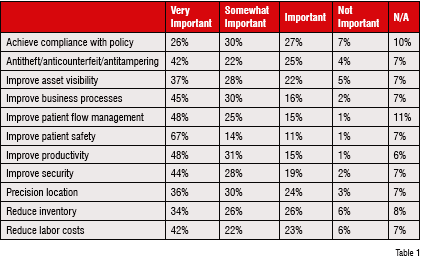
RFID is helping hundreds of healthcare facilities across UK, US and Germany to improve overall safety and operational efficiency because it operates without line-of-sight while providing read / write capabilities for dynamic item tracking.
1. The Indian healthcare sector is evolving. In this scenario how has RFID been received by the healthcare providers?
RFID is generating significant interest in the marketplace because of its robust application capabilities. RFID is helping hundreds of healthcare facilities across U.K, U.S and Germany to improve overall safety and operational efficiency because it operates without line-of-sight while providing read/write capabilities for dynamic item tracking.
We receive lots of queries from CIOs of the top Indian Hospitals to know more about RFID solutions and their benefits to healthcare. Some of the hospitals have already implemented RFID based “Dynamic Queue Management” solution for regular patients to reduce the wait time for lab testing. We plan to install the solution at some of the major hospitals in India this year.
2. Given the potential of its applications, are hospitals in India likely to take to RFID like the Retail sector has?
Definitely! If we go back five years, barcodes were visible only on products like garments and that too mostly on imported ones. Today it is in the main stream and noticeable everywhere whether one buys a coke or gets a routine check-up at a hospital. We feel, as we go along, RFID would be more ubiquitous than barcode as it makes lots of applications possible. We cannot track patient and assets in real-time using barcode but it’s very much possible with active RFID technology
RFID is moving from retailers to hospitals, manufacturing and other sectors. It would be adopted faster than barcode due to its obvious benefits.
3. Countries like the US have led the way in using RFID, how have India and other Asian countries fared in comparison?
Although adoption of RFID in India has been slow (due to lack of awareness) the number of inquiries is increasing these days mainly for patient and asset tracking. In India, the general tendency is to follow the adoption rather than lead the revolution. Singapore and other neighboring countries are doing much better. Some of the major hospitals in Singapore like, Alexandra Hospital, and The National University Hospital, Singapore General Hospitals had implemented RFID technologies to track patients, staff and assets. The solution was a huge success during SARS outbreak. Similarly it is seen that there are lots of implementations in countries like China, Philippines, South Korea, Japan, U.A.E. and other technology leading countries.
4. What all applications are possible with RFID? Which departments of a hospital could benefit from its application?
RFID can bring lots of benefits in healthcare in managing various resources like blood samples, assets and patients. RFID is considered as a key technology in eliminating some of the major bottlenecks in hospital management and improving process efficiencies. In one of the major surveys in the U.S. on benefits of the RFID technology in healthcare, 70% cited the patient safety as the major factor to implement RFID. Using RFID active RFID wristband tags like the ones provided by Orizin, a patient can be easily tracked across hospital and their movement can be controlled to un-wanted places.
Asset tracking and utilisation is another bottleneck in hospital management that RFID promises to eliminate. In an emergency situation, locating crucial equipment like a ventilation pump could be a challenging task, which could be easily facilitated by RFID. Moreover, a major number of equipment in hospitals is rented and it becomes very difficult to estimate the usage and maintenance.
Some of the benefits as observed by the actual users are mentioned below:
5. What challenges exist in the implementation of this technology in Indian hospitals? How important a factor is cost?
We don’t see any major challenge in implementing active RFID technology, as the it is robust and stable. We follow HL-7 protocol, a widely used industry standard to communicate with existing healthcare solutions. Lack of this standard could poise a real-challenge in implementation.
There are minor challenges like accommodating RFID devices in the existing infrastructure, as it requires ethernet and power connectivity and a hospital may need to upgrade the facilities. This is acceptable. We are also launching Wi-Fi based RFID sensors that could easily fit in hospitals existing infrastructure. Unlike, other segments, RFID does not demand change in existing business process when it comes to hospital.
Please provide your opinion on the second part of the question related to the cost aspect.
6. How do you see the future of RFID in healthcare shaping up, globally as well as in India?
We are very much upbeat with the potential of RFID in healthcare segments. As per some of the major reports, healthcare vertical’s consumption of RFID tags and services will rise from US$ 90 million this year to US$ 2.1 billion in 2016. We feel what we see today is just the tip of the iceberg; the best is yet to come.
7. Any other comments you would like to make?
I would like to share an excerpt from the report “RFID in Healthcare: Poised for Growth”, a survey of health care executives, by Bearing Point and the National Alliance for Health Information Technology, November 2005.

How hospitals rate RFID’s business benefits
The top four business benefits expected by using RFID are: improved patient safety, patient flow management, productivity and business processes. The majority rated achieving compliance with policy as only “somewhat important” as opposed to “very important.” (Table 1)
Most facilities are in the discovery and information gathering stage in evaluating RFID. In 12 months, most expect them to be in the experimentation test phase, and in 24 months the majorities are expected to have projects deployed.